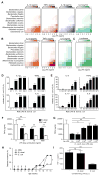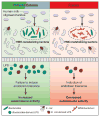Variation in Microbiome LPS Immunogenicity Contributes to Autoimmunity in Humans
- PMID: 27133167
- PMCID: PMC4950857
- DOI: 10.1016/j.cell.2016.04.007
Variation in Microbiome LPS Immunogenicity Contributes to Autoimmunity in Humans
Erratum in
-
Variation in Microbiome LPS Immunogenicity Contributes to Autoimmunity in Humans.Cell. 2016 Jun 2;165(6):1551. doi: 10.1016/j.cell.2016.05.056. Cell. 2016. PMID: 27259157 No abstract available.
Abstract
According to the hygiene hypothesis, the increasing incidence of autoimmune diseases in western countries may be explained by changes in early microbial exposure, leading to altered immune maturation. We followed gut microbiome development from birth until age three in 222 infants in Northern Europe, where early-onset autoimmune diseases are common in Finland and Estonia but are less prevalent in Russia. We found that Bacteroides species are lowly abundant in Russians but dominate in Finnish and Estonian infants. Therefore, their lipopolysaccharide (LPS) exposures arose primarily from Bacteroides rather than from Escherichia coli, which is a potent innate immune activator. We show that Bacteroides LPS is structurally distinct from E. coli LPS and inhibits innate immune signaling and endotoxin tolerance; furthermore, unlike LPS from E. coli, B. dorei LPS does not decrease incidence of autoimmune diabetes in non-obese diabetic mice. Early colonization by immunologically silencing microbiota may thus preclude aspects of immune education.
Copyright © 2016 Elsevier Inc. All rights reserved.
Figures






Comment in
-
Microbiome: Is LPS the key to the hygiene hypothesis?Nat Rev Microbiol. 2016 Jun;14(6):334-5. doi: 10.1038/nrmicro.2016.74. Epub 2016 May 9. Nat Rev Microbiol. 2016. PMID: 27157276 No abstract available.
References
-
- Bach JF. The effect of infections on susceptibility to autoimmune and allergic diseases. The New England journal of medicine. 2002;347:911–920. - PubMed
Publication types
MeSH terms
Substances
Grants and funding
LinkOut - more resources
Full Text Sources
Other Literature Sources
Medical
Molecular Biology Databases

